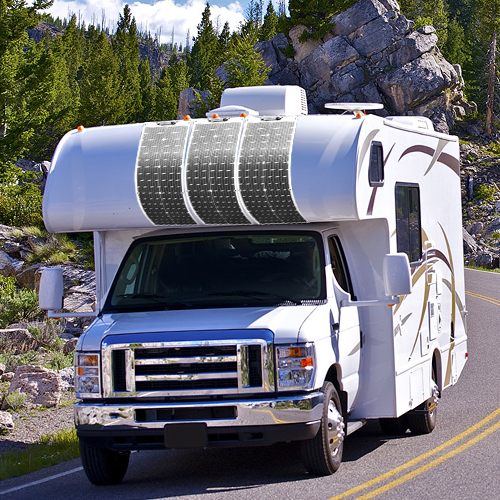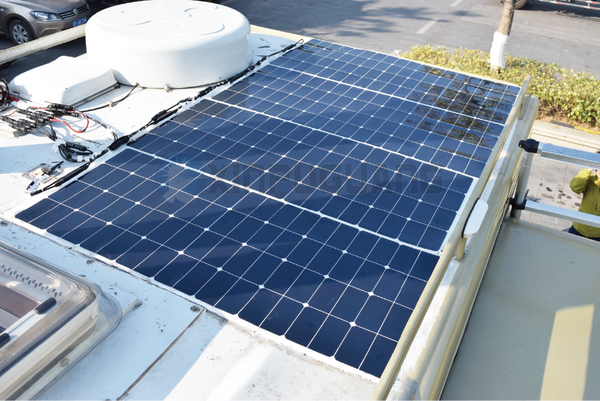
A best solutions for RV PV systems
What is solar power system for RV ?
It will be a solution including solar panel + inverter + battery storage. Solar panel collect energy from sun and save it into the battery. The battery will provide electricity to home appliance and electronic device through DC-AC inverter.
Do I need a solar power system for RV ?
Talking about building a solar power system in RV, we all know it will bring you more advantages than RV electric hookups in parking lot or campground. You will need solar power kit in RV if you are looking for some distinguishing RV lifestyle as following :
- Energy independent – you don’t need to connect to grid when boondocking, solar power system provide totally self-sustainable energy supply for off-grid camping site.
- More place to go – with solar power system and battery storage, you can go further deep into nature wild and enjoy amazing view where is usually very far from populated area.
- Silent and clean – stay away from those noisy and polluting oil generator, which should not exist when you are enjoying nature and privacy in remote location.
- Emergency power backup – if there is mechanical break down and you have to wait on the road or camping site for a while, solar power system will continually support your necessary equipment such as cell phone, radio and lighting.

What kind of solar power system for RV is feasible for me ?
It depends on how many electric appliance you need to use in RV, and calculate the total power consumption by those electric appliance or device. The following is example for power consumption of items in RV :
Typical RV Power Consumption Items
(Note that the Watts and Amps below are typical. Some appliance may require more or less depending on their efficiency and size)
|
Appliance (@AC 115V) |
|
Running Watts |
|
Amps |
|
|
||||
|
AM/FM |
|
8 Watts |
|
0.1 Amp |
|
|
||||
|
Air Conditioner* |
||||
|
Roof Top 13,500 BTU |
|
1600 Watts |
|
14 Amp |
|
Roof Top 15,000 BTU |
|
1700 Watts |
|
14.5 Amp |
|
Dual Basement 27,000 BTU |
|
2000 Watts |
|
18.5 Amp |
|
|
||||
|
Blender* |
|
300 Watts |
|
2.6 Amp |
|
Blow Dryer (Hair)* |
|
900-1500 Watts |
|
7.8-13 Amp |
|
Can Opener* |
|
120-300 Watts |
|
1.0-2.6 Amp |
|
CD/DVD Player |
|
35-100 Watts |
|
0.3-0.9 Amp |
|
Clock Radio |
|
50 Watts |
|
0.4 Amp |
|
|
||||
|
Electric Water Heater (6 gallon) |
|
1440 Watts |
|
12.5 Amp |
|
Fan |
|
40-300 Watts |
|
0.4-2.6 Amp |
|
Furnace Fan *(1/3 HP) |
|
1200 Watts |
|
10.4 Amp |
|
Heating Pad |
|
250 Watts |
|
2.2 Amp |
|
Hot Plate |
|
1200 Watts |
|
10.4 Amp |
|
Iron |
|
1000-1500 Watts |
|
8.7-13.0 Amp |
|
Microwave (600 to 1000 W cooking power) |
|
1100-2000 Watts |
|
9.6-17.4 Amp |
|
Mini Lights (Christmas Type - 50) |
|
25 Watts |
|
0.2 Amp |
|
Power Converter |
|
575-800 Watts |
|
5.0-7.0 Amp |
|
Refrigerator/Freezer* |
|
400-1200 Watts |
|
3.5-10.4 Amp |
|
Satellite Dish & Receiver** |
|
200-250 Watts |
|
1.7-2.2 Amp |
|
Shaver |
|
35 Watts |
|
0.3 Amp |
|
Space Heater |
|
1000-1500 Watts |
|
8.7-13.0 Amp |
Typical RV Power Consumption Items
(Note that the Watts and Amps below are typical. Some appliance may require more or less depending on their efficiency and size)
|
Appliance (@DC 12V) |
|
Running Watts |
|
Amps |
|
|
||||
|
Aisle Light |
|
12 Watts |
|
1 Amp |
|
CO Detector |
|
12 Watts |
|
1 Amp |
|
Fluorescent Light |
|
24 Watts |
|
1-2 Amps |
|
Furnace |
|
144 Watts |
|
10-12 Amps |
|
LP Gas Leak Detector |
|
12 Watts |
|
1 Amp |
|
Overhead lights (Per Bulb) |
|
12 Watts |
|
1 Amp |
|
Porch Light |
|
12 Watts |
|
1 Amp |
|
Power Roof Vent |
|
18 Watts |
|
1.5 Amps |
|
Radio/Stereo |
|
48 Watts |
|
4 Amps |
|
Range Hood (Fan & Light) |
|
36 Watts |
|
2-3 Amps |
|
Refrigerator (LP Gas Mode) |
|
24 Watts |
|
1.5- 2 Amps |
|
Security System |
|
12 Watts |
|
1 Amp |
|
Television (12 volt) |
|
60 Watts |
|
4-5 Amps |
|
TV Antenna Booster |
|
10 Watts |
|
<1 Amp |
|
TV Antenna Booster 12 Volt outlet |
|
120 Watts |
|
Up to 8 Amps |
|
Variable Speed Ceiling / Vent Fan |
|
48 Watts |
|
4 Amps |
|
VCR Recorder / Player |
|
24 Watts |
|
2 Amps |
|
Water Pump |
|
48 Watts |
|
4 Amp |
Hopefully this clears up any confusion on the difference between using amps supplied by the campground electrical source (AC amps), and using amps supplied by the converter (DC Amps).

After calculating total power consumption, for example AC 500W, then we have to know how much time they are being used, for example, 6 hours / per day. Then we can know the power consumption is 500W x 6 hours = 3000Wh / per day.
And we will need at least AC 500W inverter output
Next step, we need to choose the battery type and size. 12V 150Ah AGM and Gel deep cycle battery is recommended for solar power system. One battery can provide 12V x 150Ah = 1800Wh power storage, in this case we will need 2 pcs battery 1800Wh x 2 = 3600Wh to cover the power consumption.
Then we have to calculate how many pcs solar panel, the effective solar exposure is about 4 to 6 hours a day, let’s use 5 hours, 3000Wh / 5 hours = 600W, We need 600W solar panel to supply daily use in RV.
However, this is very rough calculation, which is just for idea-catching. The actual usage time and real efficiency of solar power system is determined by many factors, including daily weather change, the quality of solar panel / inverter / battery, the discharging setting of battery, and the installation and wiring quality… etc.
You have a project in mind? Give us a call. We’ll make it easy for you.
For more information, please follow XINPUGUANG official website:
Facebook: Xinpuguang Solar Panel Instagram: xinpuguangsolar
Pinterest: XinpuguangSolarPanels
Homepage: https://xinpuguangsolar.com
Email address: Philip@isolarparts.com
- Als u een selectie kiest, wordt de pagina volledig vernieuwd.
